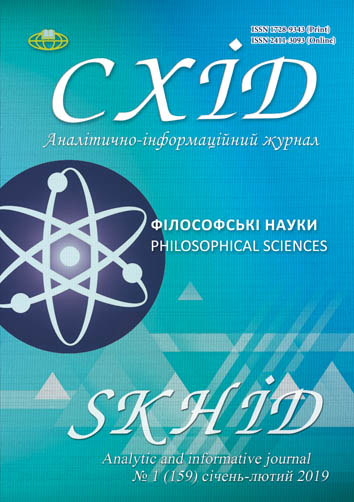Ambivalence of metaphorical thinking in the context of search for senses
DOI:
https://doi.org/10.21847/1728-9343.2019.1(159).158076Keywords:
metaphor, metaphorical thinking, ambivalence, search for senses, H. Hobbes, J. Locke, K. Marx, «Leviathan», «voice of reason», «capital»Abstract
The paper discloses the question of ambivalent character of the metaphor as means of expression of the meaning. The metaphor appears as effective phenomenon in cognitive process. At the same time, in particular philosophical texts the metaphor can reduce the subject of the research and bring self-contradictory meanings. The author’s position consists in the idea that in general the metaphor is not effective means for the practical research, however, the metaphorical argumentation reveals the dual character of social or historical phenomena. The author demonstrates the functioning of the social metaphors with examples of the works of T. Hobbes, J. Locke, K. Marx and shows that they can be reconsidered conceptually in the light of context of the use. Depending on the such context, self-contradiction appears, ambivalence of the metaphorical potential and the meaning of the research phenomenon can appear ambiguous. Using the methods of the analysis and comparison, the author aimed at re-analyzing the metaphor as means of the search and reflection of the sense; reflecting its ambivalent character in cases when it is used in the social or epistemological researches; revealing the dual connotation of the metaphorical argumentation in particular philosophical works.
Generalized results of the paper can be shown by the following statements: 1)The metaphorical meaning of concepts in social, historical, epistemological practice partly replaces the direct meaning and forms further human culture in a trail from deviation to norm. 2) The concepts “Leviathan» (T. Hobbes), “voice of reason” (J. Locke), “capital” (K. Marx) in metaphorical interpretation form ambivalent historical narratives of criteria of the justice, the truth, the social law and in as such form further human culture. 3) The inner potential of the researches connected with the variety of metaphorical uses is especially important to the sphere of socio-philosophical and socio-political searches.Downloads
References
Aristotle (350 B.C.E). Rhetoric. Translated by W. Rhys Roberts. Retrieved from http://classics.mit.edu/Aristotle/rhetoric.html (In English).
Cassirer, E. (1983 [1925]). Sprache und Mythos: Ein Beitrag zum Problem der Götter-namen. Philosophie der symbolischen Formen. Darmstadt: Wissenschaftliche Buchgesellschaft. (In German).
Deleuze, G. (1971). Capitalism, flows, the decoding of flows, capitalism and schizophrenia, psychoanalysis, Spinoza. Anti-Oedipus: Capitalism and Schizophrenia (2) Mille plateaux. (In English).
Deleuze, G. (1990). The logic of sense, New York: Columbia University Press. (In English).
Duit, R. (1991). On the role of analogies and metaphors in learning sciences. Science Education, 75(6): 649-672. DOI: https://doi.org/10.1002/sce.3730750606 (In English).
Frankl, V. E. (2014). Man's search for meaning. Boston: Beacon Press (In English).
Haglund, J. (2017). Good Use of a 'Bad' Metaphor. Entropy as Disorder. Science & Education, 26 (3-4), pp. 205-214. DOI: https://doi.org/10.1007/s11191-017-9892-4 (In English).
Halberstam, J. (1995). Skin Shows: Gothic Horror and the Technology of Monsters. Durham, NC: Duke University Press (In English).
Hobbes, T. & ProQuest (Firm). Leviathan: the matter, forme & power of a common-wealth ecclesiastical and civill (In English).
Jakobson, R. & Halle, M. (1971). Fundamentals of language, 2d revised, The Hague: Mouton (In English).
Kampourakis, K. (2016). The Bad Use of Metaphors and the Use of Bad Metaphors. Science & Education, 25(9-10), pp. 947-949. DOI: https://doi.org/10.1007/s11191-016-9870-2 (In English).
Lakoff, G. & Johnson, M. (2003). Metaphors we live by. Chicago, Ill.; London: University of Chicago Press (In English).
Locke, J. (1690). An essay concerning humane understanding. In four books. London: Printed for Tho. Basset, and sold by Edw. Retrieved from ftp://ftp.dca.fee.unicamp.br/pub/docs/ia005/humanund.pdf (In English).
Marx, K. (1973). Grundrisse. Foundations of the Critique of Political Economy (Rough Draft).
Ortony, A. (1993). Metaphor and thought, 2nd, Cambridge England; New York, NY, USA: Cambridge University Press (In English).
Searle, J. R. (1993). Metaphor. In: Ortony, A. (ed.) Metaphor and Thought. Cambridge: Cambridge University Press (In English).
Tralau, J. (2007). Leviathan, the Beast of Myth Medusa, Dionysos, and the Riddle of Hobbes’s Sovereign Monster. In: Springborg, P. (ed.) The Cambridge Companion to Hobbes's Leviathan. New York: Cambridge University Press. (In English).
Tralau, J. (2011). Hobbes contra Liberty of Conscience. Political Theory, 39(1), pp. 58-84. DOI: https://doi.org/10.1177/0090591710386698 (In English).
Tralau, J. (2014). Deception, politics and aesthetics: The importance of Hobbes's concept of metaphor. Contemporary Political Theory, 13(2), pp. 112-129.
Wolterstorff, N. (1994). Locke's philosophy of religion. The Cambridge companion to Locke. UK: Cambridge University Press.
Downloads
Published
How to Cite
Issue
Section
License
Copyright (c) 2019 Ganna Stoyatska

This work is licensed under a Creative Commons Attribution-NonCommercial-NoDerivatives 4.0 International License.
1. Authors bear responsibility for the accuracy of facts, quotations, numbers and names used.
2. Manuscripts are not sent back.
3. The publisher does not always agree with the authors' opinion.
4. The authors reserve the right to authorship of the work and pass the first publication right of this work to the journal under the terms of a Creative Commons Attribution-NonCommercial-NoDerivatives 4.0 International License. This license allows others to distribute (copy) the published work for non-commercial purposes, provided there is mandatory attribution to its authors and a link to the first publication in our journal.
5. The authors have the right to conclude separate supplement agreements that relate to non-exclusive work distribution in the form in which it has been published by the journal (for example, to upload the work to the online storage of the journal or publish it as part of a monograph), provided that the reference to the first publication of the work in this journal is included.

